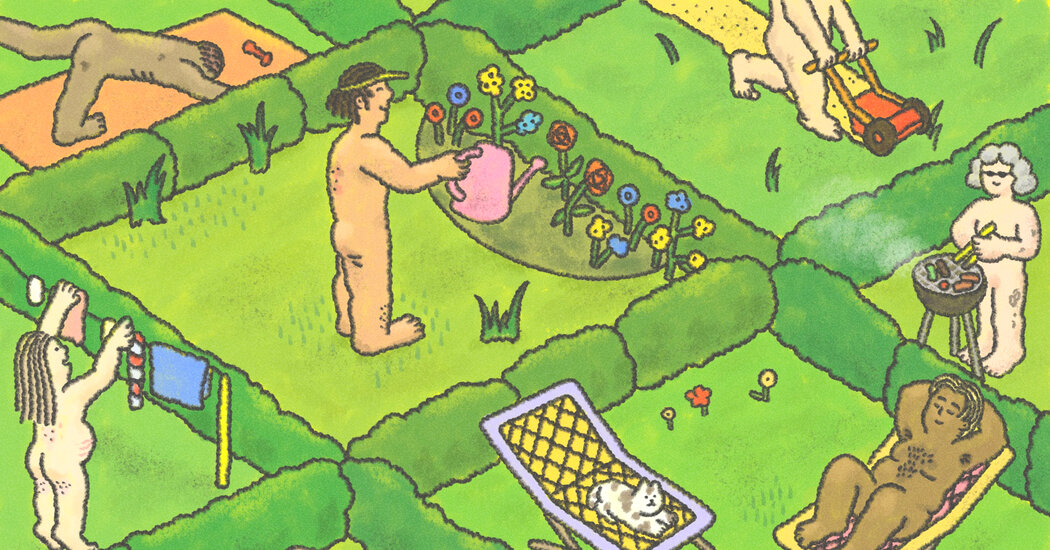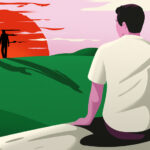When Carolyn Hawkins went to her first nude resort four decades ago, she was 37 years old and absolutely committed to keeping her clothes on.
“I said, ‘I’ll go, but I’ll never do it. I’m not taking my clothes off,’” said Ms. Hawkins, who was visiting the resort with her second husband. But surrounded by a kaleidoscope of imperfect bodies soaking up the Florida sun, she felt like an outlier and stripped down. “I took to it immediately,” recalled Ms. Hawkins, now 79 and the director for club and member relations at the American Association for Nude Recreation.
Not everybody is so comfortable being naked. For many of us, nudity — or just the prospect of baring more skin during the summer — can be fraught.
“Even being naked alone can leave us vulnerable to the critical voice in our own mind,” said Renee Engeln, a professor of instruction in psychology and the director of the Body and Media Lab at Northwestern University, which researches issues surrounding women’s body image.
The goal of feeling “good” while naked tends to be tangled up in cultural beauty standards that few of us meet, she said. Yet, therapists, body image activists and, yes, nudists contend there are compelling reasons to pursue a more joyful relationship with your own naked form, or at least a neutral one.
Research shows, for instance, that women’s perceptions of how attractive they are can influence their sexual desire, while being relatively comfortable with one’s appearance has been linked to higher self-esteem and overall life satisfaction.
“To me, it feels adjacent to the bikini conversation,” said Virgie Tovar, a body image activist and the author of “The Body Positive Journal.” She recalled her first experience wearing a bikini in public as a plus-size woman.
“It shocked me how amazing it felt to have sun on my skin, to feel wind on my flesh — a part of my body that had never been exposed anywhere outside of my home,” Ms. Tovar said. “It was more powerful than I really could have imagined.”
The four strategies below have been suggested by a range of experts who spend time thinking about nudity and body image. They won’t necessarily transform your relationship with your body as you encounter more opportunities to bare skin this summer, but they are a start.
Spend more time naked
Learning to feel good about your body can be a long, hard slog, and so many of the obstacles that stand in the way are societal. Still, Dr. Engeln says that for some people, the key to feeling better naked is “simply to be naked more often.”
Erich Schuttauf, the executive director of the American Association for Nude Recreation, agrees that there is cathartic power in simply doing stuff in the buff. You could do your laundry au naturel, he suggested, or sunbathe for 20 minutes if you have a private backyard, relishing the warmth and breeze on your bare skin.
“Get acclimated with the freedom of not having to wear clothes,” Mr. Schuttauf said, adding that he thinks just about every household chore is more fun in one’s birthday suit.
Stephanie Yeboah, a body image activist and the author of “Fattily Ever After: A Black Fat Girl’s Guide to Living Life Unapologetically,” said spending an hour or two naked several days a week was a crucial step early on in her own body acceptance journey. She would take off her clothes and read, watch TV or tidy her house.
It’s important, however, to make sure you are in a space that feels safe, whether that is in the privacy of your bedroom or a more public setting, like a nude beach or resort.
“You can’t self-love your way out of an oppressive system,” Ms. Yeboah said, adding that she’s had people call her “fat” or insult her as soon as she steps out of the house.
Focus on how your body feels
Ms. Tovar does not believe working toward feeling better naked is a requisite step to broader body acceptance. But she encourages anyone struggling with being naked to consider how it would feel to be at peace with their bodies when they have to be nude, like in the shower.
To get there, Ms. Tovar recommends using mindfulness strategies to shift focus from how your body looks naked to how it feels. The shower is a good place to start.
“Focus on the sensations,” Ms. Tovar said. “What does it feel like on my skin when I step in the shower? What is the temperature like? What does it do to my body?”
Centering the senses can help you connect brain and body.
Ms. Yeboah has also turned showering into a regular meditation. She buys nice lotions and oils, and takes the time to apply them slowly, carefully noting how they smell and feel on her skin.
“It was something I started doing on my self-love journey in order to kind of come to terms with — and learn how to re-love — my body,” she said.
Ask yourself: Am I avoiding being naked?
Zoë Bisbing, a licensed clinical social worker and the founding director of Body-Positive Therapy NYC, often works with patients who are struggling in what she calls a “state of body avoidance.” They painstakingly cover certain body parts and rarely, if ever, really look at themselves, she said. Often, they will opt out of activities like hitting the beach, going out on a hot day or having sex.
Ms. Bisbing recommends consciously noting whether you are avoiding your naked body (or certain body parts) over the course of a day or two. If you are, it may be helpful to try a kind of D.I.Y. exposure therapy — a well-known cognitive intervention that aims to desensitize people to their fears.
“Let’s say you’re someone who is really uncomfortable with their arms out, even alone,” Ms. Bisbing said. “You might start with one minute a day when you are without a cardigan.” Then you build up to two minutes. Eventually, you try it around others. It can also help to look at your body in the mirror for short periods of time, she said, and train your brain to describe it using simple, nonjudgmental language.
It is critical, however, for anyone grappling with concerns like body dysmorphia or disordered eating to connect with a therapist to get help, Ms. Bisbing said. So be mindful of potential signs of a more serious mental health issue, including distorted body image or feelings of shame about what you eat.
Surround yourself with images of different body types
Pop culture and social media have conditioned us all to see the “slender body, or the young body, or the able body” as the default and the most worthy, Ms. Tovar said. “But that just really isn’t accurate.” So she encourages everyone to surround themselves with pictures of different body types.
“Print out, say, 20 images of bodies that are closer to yours and bodies that are larger,” Ms. Tovar said. Save them to your phone or put them around your mirror so you see them often.
Curate what you follow on Instagram, Facebook or TikTok as well. Though the link between social media and negative body image isn’t as clear-cut as it is sometimes made out to be — and the body positivity movement has faced some criticism — research shows that spending time looking at body-positive content online can boost your mood.
“Remember that nearly all adult naked bodies jiggle or wobble, have hair, have cellulite, have scars, have the marks of living,” Dr. Engeln said. “It’s easy to forget this if you’re mired in a media world that only includes Photoshopped images of the young and thin.”
Credit: Source link



